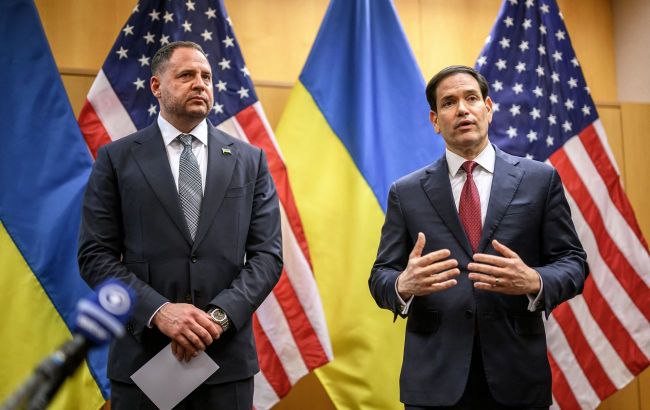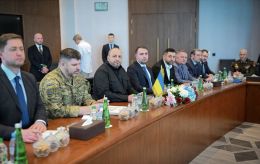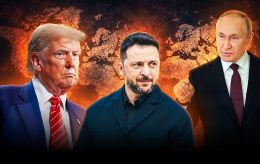US peace plan for Ukraine: What changed after Geneva and what's coming this week
 Photo: Rubio and Yermak gave a positive assessment of the initial results of the Ukraine-US talks in Geneva on the peace plan (Getty Images)
Photo: Rubio and Yermak gave a positive assessment of the initial results of the Ukraine-US talks in Geneva on the peace plan (Getty Images)
After receiving the draft peace plan from the US, Ukraine held the first round of negotiations with the American delegation in Geneva. President Zelenskyy says that there are signs that Trump's team heard us and that diplomacy has gained new momentum.
RBC-Ukraine has compiled the main events surrounding the peace plan before and after the meeting in Geneva, and what to expect next.
Key points:
- Kyiv received a draft peace plan from the US.
- The Ukrainian delegation held the first round of negotiations with the US in Geneva on November 23.
- Washington and Kyiv have prepared an updated and revised framework document on peace.
- Controversial points (the size of the Armed Forces of Ukraine, the Zaporizhzhia Nuclear Power Plant, and the exchange of prisoners) will be adjusted.
- The issues of territories and non-accession to NATO have been raised to the presidential level.
- Europe has prepared its counterproposals.
- Zelenskyy said that Trump's team heard Kyiv, and diplomacy has been activated.
- Diplomacy continues, and negotiations will continue.
- The final decision on the peace plan will be made by the Presidents of the US and Ukraine.
- Trump and Zelenskyy may meet this week or next week. The date will depend on further agreements.
US-Ukraine meeting in Geneva
Ukraine and the US issued a joint statement following bilateral talks in Geneva on November 23 on achieving peace. The parties said they had prepared an updated and revised framework document on peace.
The meetings were attended by US Secretary of State Marco Rubio, Trump's special envoy Steve Witkoff, US Army Secretary Dan Driscoll (who recently visited Kyiv), and Trump's advisor and son-in-law Jared Kushner. Ukraine was represented by a delegation led by the head of the Presidential Office, Andrii Yermak.
A joint statement said the consultations were extremely productive. The discussions demonstrated significant progress in aligning positions and identifying clear next steps. The parties confirmed that any future agreement must fully respect Ukraine's sovereignty and ensure a sustainable and just peace.
Kyiv and Washington agreed to continue intensive work on joint proposals in the coming days. They will also maintain close contact with European partners as the process moves forward.
After the round of talks, the White House said that the Ukrainian delegation had positively assessed the changes made to the plan based on its comments.
The final decisions on this framework document will be made by the presidents of Ukraine and the United States. This was emphasized by Yermak and Rubio.
Negotiations entered the most productive stage
US Secretary of State Marco Rubio said after the talks that Sunday had been the most productive day in the entire history of cooperation on peace, although he acknowledged that work is still ongoing. At the same time, he noted that the parties had significantly reduced the list of unresolved issues.
Rustem Umerov, Secretary of the National Security and Defense Council of Ukraine, who is among the members of the Ukrainian delegation, noted that the updated plan takes into account most of Kyiv's priorities.
According to the American side, the document they proposed is capable of revitalizing the diplomatic process.
US President Donald Trump, who initially set a deadline to reach an agreement with Ukraine by Thanksgiving (November 27), has now softened it. He described the deadline as flexible and said on Saturday that the plan was not a final proposal.
Rubio confirmed the United States has abandoned the hard deadline and now the terms will be flexible. He noted that the deadline for Ukraine to sign a peace agreement set by the US president could be postponed.
According to sources at The Economist, the deadline for Ukraine to accept the peace plan may be extended by another week.
According to Reuters, the Trump administration is threatening to stop providing intelligence and selling weapons to Ukraine if Kyiv does not sign the peace agreement proposed by the US.
What was agreed in Geneva
Neither Rubio, nor the White House, nor the Office of the President of Ukraine has officially provided details on any progress made in the Geneva talks.
However, according to sources at RBC-Ukraine, the parties managed to agree on most of the provisions of the US plan and to adjust a significant part of the controversial ones. These include the size of the Armed Forces of Ukraine, the Zaporizhzhia Nuclear Power Plant, the format of prisoner exchanges, and the return of convicts.
On the other hand, according to RBC-Ukraine, the delegations agreed to put on hold the points concerning territories and enshrining Ukraine's non-accession to NATO in the Constitution, which are to be discussed and agreed upon at the level of Presidents Zelenskyy and Trump.
Their meeting may take place this week or next, although no specific date was agreed upon in Geneva.
According to CBS News, a possible visit by Zelenskyy to the US is being discussed, and the date itself will depend on the negotiations.
Meanwhile, Bloomberg, citing sources, wrote that the US allegedly asked Ukraine to confirm that it had contributed to the proposals after it became clear that Moscow had made a significant contribution to the plan.
What Ukraine offered
The Ukrainian side is known to have counterproposals for the American side. Two Axios sources familiar with the Geneva talks reported that Rubio and Yermak's optimistic statements came a few hours after a tense meeting on Sunday.
They said that during the meeting, the American side accused the Ukrainians of leaking negative details of the plan to the American press.
The Ukrainian delegation allegedly agreed to reveal a positive statement from one of its negotiators to clarify the situation, the source adds.
Later that day, the Ukrainian side presented a counterproposal requesting changes to Trump's plan, Axios adds.
In response, the US expressed its willingness to make some changes based on Ukraine's counterproposal.
Essence of US plan and Europe's counterproposals
According to the initial version of the 28-point peace plan, which Witkoff and Rubio had been quietly working on over the past month with Kremlin special envoy Kirill Dmitriev, Ukraine would have to:
- Reduce the size of the Armed Forces of Ukraine to 600,000
- Give up the Donbas
- Agree never to join NATO
- Grant full amnesty to Russians suspected of war crimes.
The full text of this peace plan can be read in a separate article.
As RBC-Ukraine learned from sources, this comprehensive 28-point document is not the final version, but was submitted last week by the American delegation to the Ukrainian side for discussion.
However, there is another, additional document entitled Framework Agreement on Security Guarantees for Ukraine, which, as stated in its text, was created based on the principles of Article 5 of NATO. According to RBC-Ukraine, this framework agreement contains three points:
- The US President may use military force, intelligence, logistical support, economic and diplomatic measures, and other actions he deems appropriate.
- NATO, as well as France, the United Kingdom, Germany, Poland, and Finland, undertakes to act in concert with the US in the event of aggression against Ukraine.
- The framework agreement is valid for 10 years with the possibility of extension.
In response, according to Western media reports, European allies have prepared a counterproposal rejecting several of the conditions in the US plan. According to The Telegraph, these proposals include limiting the size of the Ukrainian Armed Forces to 800,000 personnel in peacetime and making Ukraine's accession to NATO contingent on the consensus of the bloc's members. Among other things:
- Ukraine will receive financial compensation, in particular from Russian assets, which will remain frozen until Moscow compensates Ukraine for the damage caused
- Kyiv promises not to return the occupied territories by military means
- Negotiations on territorial issues will begin with the line of contact
- Ukraine will hold elections as soon as possible after the signing of the peace agreement
- Ukraine will receive security guarantees from the US, similar to Article 5 of NATO.
Zelenskyy says Trump's team has started to listen to Ukraine
Yesterday evening, following the US-Ukrainian negotiations, President Volodymyr Zelenskyy said in a video address that there are signs that the administration of US President Donald Trump is listening to Ukraine's position and that diplomacy has gained new momentum.
"Diplomacy has been activated, which is good. We expect that this will result in the right steps being taken. The priority is reliable peace, guaranteed security, respect for our people, respect for everyone who gave their lives defending Ukraine from Russian aggression," Zelenskyy said.
The head of state noted that today will be no less active in terms of diplomacy.
At the same time, against the backdrop of negotiations in Geneva, Trump sharply criticized the Ukrainian authorities, calling them ungrateful and placing the responsibility for the war on his predecessor, Joe Biden.
The Ukrainian leader responded to this statement by emphasizing that Ukraine is grateful to the United States, to every American heart, and personally to President Trump for the help that, starting with the Javelins, is saving the lives of Ukrainians.
Today, the Presidents of Finland and Ukraine, Alexander Stubb and Volodymyr Zelenskyy, held talks during which they discussed the results of negotiations between the American and Ukrainian delegations in Geneva on a peace plan.
Stubb announced progress achieved during yesterday's meetings in Geneva. According to him, the negotiations were a step forward, but there are still important issues that need to be resolved.
However, according to ISW analysts, Russia continues to reject any peace proposals, including the initial 28-point plan of the United States, which does not meet Moscow's long-standing demands for the destruction of Ukrainian statehood and the weakening of NATO.
Analysts estimate that Russia is unlikely to accept any peace plan that does not provide for Ukraine's actual surrender.
Commenting on the US peace plan today, Zelenskyy said that Ukraine is currently at a critical moment. The President noted that there is a lot of noise in the media and political pressure on Kyiv.
Sources: The Economist, CBS News, Bloomberg, Axios, and The Telegraph.

